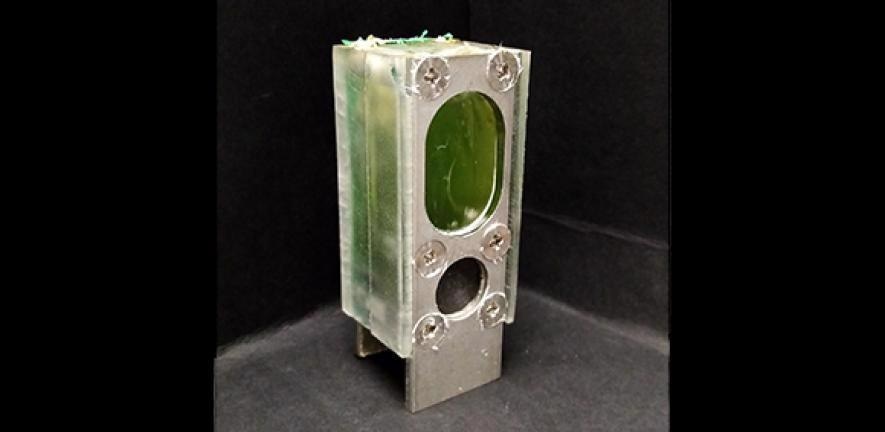Scientists have used a wide range of blue-green algae species to drive a microprocessor uninterruptedly for a year and counting, using only ambient light and water. Their innovative technology has the potential to be a reliable and renewable approach for driving small devices.

Image Credit: Paolo Bombelli
The technology platform, which is the size of an AA battery, comprises a variety of non-toxic algae known as Synechocystis that naturally collects energy from the sun via photosynthesis. The minuscule electrical current this produces then interacts with an aluminum electrode and is used to drive a microprocessor.
The platform is composed of common, low-cost and mostly recyclable materials. This means it could be replicated hundreds of thousands of times without difficulty to fuel large numbers of small equipment as part of the Internet of Things. The scientists say it is probably most beneficial in remote locations or off-grid situations, where small amounts of energy can be very useful.
The growing Internet of Things needs an increasing amount of power, and we think this will have to come from systems that can generate energy, rather than simply store it like batteries. Our photosynthetic device doesn’t run down the way a battery does because it’s continually using light as the energy source.
Professor Christopher Howe, Study Joint Senior Author, Department of Biochemistry, University of Cambridge
The device was used to drive an Arm Cortex M0+ in the experiment, which is a microprocessor used extensively in the Internet of Things equipment. It ran in a domestic environment and semi-outdoor setting exposed to natural light and related temperature variations, and after 6 months of nonstop power production, the results were presented for publication.
The study has been published recently in the journal Energy & Environmental Science.
We were impressed by how consistently the system worked over a long period of time—we thought it might stop after a few weeks but it just kept going.
Dr. Paolo Bombelli, Study First Author, Department of Biochemistry, University of Cambridge
The algae does not have to be fed, because it forms its own food as it photosynthesizes. In addition, even though photosynthesis necessitates light, the device can even continue generating power during times of darkness. The scientists believe this is due to the algae processing a little bit of its food when there is no light, and this carries on to produce an electrical current.
The Internet of Things is a massive and expanding network of electronic devices — each using only a tiny amount of energy — that gather and share instantaneous data through the internet. Using low-cost computer chips and wireless networks, many billions of devices are part of this network, from smartwatches to temperature sensors in power stations. By 2035, this figure is predicted to increase to one trillion devices, necessitating a huge number of portable energy sources.
The scientists say that driving trillions of Internet of Things devices with lithium-ion batteries would be unfeasible: it would necessitate three times more lithium than what is created across the world per annum. Furthermore, conventional photovoltaic devices are made using unsafe materials that have harmful environmental impacts.
The study was a partnership between the University of Cambridge and a company leading the engineering of microprocessors, Arm. Arm Research created the ultra-efficient Arm Cortex M0+ testchip, constructed the board, and put together the data-collection cloud interface exhibited in the experiments.
The National Biofilms Innovation Centre funded the study.
Journal Reference:
Bombelli, P., et al. (2022) Powering a microprocessor by photosynthesis. Energy & Environmental Science. doi.org/10.17863/CAM.83468.